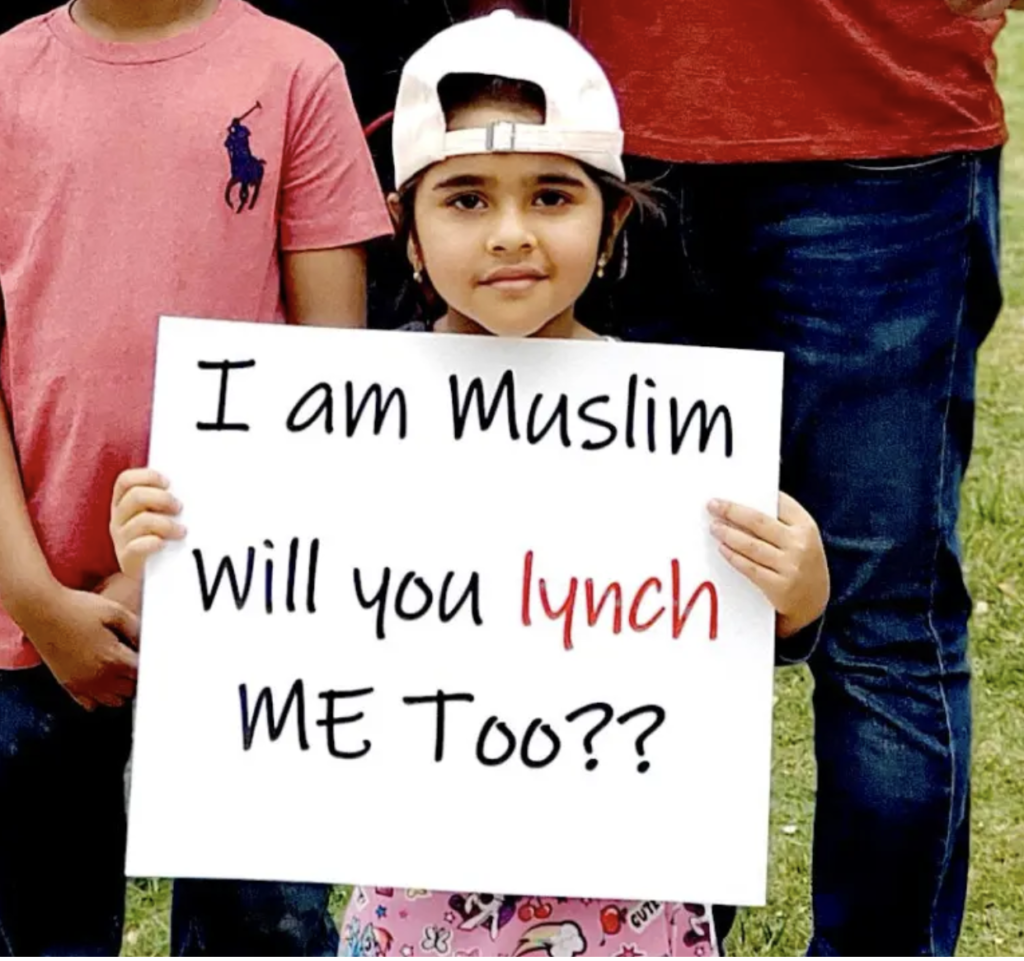What can American Muslims Do?

By Muqtedar Khan
September/October 2022
Indian Muslims are going through a very treacherous and hazardous period in their history. Their lives and livelihoods, rights and culture, places of worship and even homes are at risk and under daily assault by some governmental agencies and extremist organizations. The situation is precarious. If corrective measures are not taken by New Delhi, the country’s political parties and judiciary, as well as the international community, this crisis could explode into a humanitarian disaster of catastrophic proportions.
Hindutva and the Modi Government
Hindutva is a Hindu nationalist movement that seeks to privilege the Hindu faith and equate Indianness with being Hindu. While the movement itself is over 100 years old, during the past three decades it has gained significant influence sociopolitical power. The turning points leading to its ascendance were the 1992 demolition of the Babri mosque and the 2002 massacres of Muslims in Gujarat state.
The multilayered movement has cadre-based member organizations like the RSS (Rashtriya Swayamsevak Sangh), which is its heart and soul, and political parties like the ruling Bharatiya Janata Party (BJP), student wings and street thugs like the Bajrang Dal.
Since 2014, when Narendra Modi became prime minister and his party, the BJP, gained an absolute majority in Parliament, this ideology has weaponized many governmental functions, including making laws, to wage an economic and cultural war against Muslims.
Hindutva’s adherents seek to transform India from a secular, pluralist democracy into a majoritarian Hindu state in which Hindu religion and culture are dominant and exclude all other faiths and cultures. It hopes to achieve this by erasing the country’s glorious Islamic past, forcing Islam and Muslims to become invisible in the public arena and destroying their spirit and resolve to defend their cultural identity and heritage, and rendering their electoral power moot.
In pursuit of these goals, they are renaming cities and landmarks that have Muslim names and seeking to convert into temples or renaming icons of Islamic heritage, such as the Qutub Minar and the Taj Mahal. Muslims are lynched for allegedly eating and trafficking in beef — in 2021 India was the world’s sixth largest beef exporter — and emerging Muslim leaders are harassed and jailed for speaking up. Parliament is also passing laws prejudicial to Muslims, like the Citizenship Amendment Act, and reshaping the constitution (abrogating articles 370 and 35A). During BJP’s rule, Muslims have become incredibly insecure and democracy has become very fragile.
India’s Muslims
Often described as the world’s largest democracy, India has allowed nearly all its institutions to become ideologically corrupted and captured by this movement. The police and other law enforcement agencies often act in concert with violent Hindutva groups and mobs, watching without intervening when Muslims are subjected to mob violence. Even the courts, including state high courts and the Supreme Court, are making communal-based decisions.
The Karnataka high court’s decision to endorse the policy of banning Muslima students from wearing the burqa or hijab in schools, a decision that contradicts the freedom of religion guaranteed by the constitution, is one example. The Supreme Court’s decision to treat Hindu mythology as fact in its decision on the Babri Masjid case is another example of how the courts sometimes privilege majority sentiment over facts.
Muslim are the country’s most economically underdeveloped, academically most backward and politically most marginalized community. This reality is often hidden by the success of Muslims in some sectors, such as sports and entertainment, and in some regions where Hindutva’s penetration is limited.
Since the Sachar Committee’s revelations in 2006, this systematic and structural discrimination and neglect has become an indisputable fact. This seven-member blue-ribbon commission was established in March 2005 by then Prime Minister Manmohan Singh, under the chairmanship of former Chief Justice of Delhi High Court Rajinder Sachar, to study the Muslim’s social, economic and educational condition.
Muslims have suffered from policies enacted by Hindutva and so-called secular parties for decades. Consequently, they lag far behind other communities, even the so-called Other Backward Classes, in every area of socioeconomic development, income, education, health, political power, physical security and religious freedom. New Delhi uses this collective term to classify castes that are educationally or socially disadvantaged. It is one of several official classifications of India’s population, along with General Class, Scheduled Castes and Scheduled Tribes.
Muslims face serious and numerous challenges. Here they are clustered in the following categories: (1) Underdevelopment: There is relative underdevelopment and a continuously growing achievement gap between Muslims and non-Muslims; (2) Existential threat: Frequent violence — lynching and brutal beatings — by Hindu nationalists and the frequent calls for genocide and the community’s destruction; (3) The periodic emergencies: BJP governments regularly destroy Muslims’ homes, and police do the same with Muslims’ property and businesses during riots. Additionally, pandemics, natural disasters and bad policies have a disproportionately devastating impact on them because of their relative poverty and government neglect.
What Can American Muslims Do?
While there are limits to what American Muslims can do, by virtue of their location and resources, they can do a lot. There are a few things they can do, and one thing they must not do.
• Increase awareness. India has a lot of soft power and enjoys a very positive reputation as the world’s largest democracy, the land of Gandhi and nonviolent struggle, and as one of the biggest and fastest growing economies and a technology hub. It also has the world’s largest diaspora, which is very talented and contributes to this image.
Hence it is important to engage with policymakers, media leaders and opinion makers to make them see Hindutva’s danger and threat. Less than 10% of the Indian American diaspora lives in the U.S., and a very small percentage of them are actively engaged with this issue. Thus, Muslim Americans must step up to help them.
• A few Indian Muslim organizations in the U.S. are trying to address the challenges in India. You can help them financially, volunteer and use your sociopolitical capital to strengthen them and their connections to the corridors of influence in the U.S.
The Indian American Muslim Council (IAMC.com) is the largest and most impactful advocacy group. There are others, but IAMC is the most visible and influential one both here and in India. Its members focus on the Hindutva movement.
Indian Muslim Relief and Charities (IMRCUSA.org) provides emergency relief and financial assistance to projects that support India’s most vulnerable Muslims. They have spent decades providing this relief and helping Muslims fulfill their religious duties of zakat and udhiya (Eid sacrificial meat). Channeling your charity through IMRC will help them continue this effort.
Another core issue is the community’s relative poverty and underdevelopment. If it were more robust economically and better on the educational achievement parameter, Hindutva’s threat would be less ominous. The long-term solution is to invest in economic development and education. This is not as pressing as it may seem, but it must be addressed thoughtfully.
The U.S. Indian Policy Institute (USIPI.org) and the American Federation of Muslims of Indian Origin (AFMI) are trying to address these issues. However, they are strapped for resources and need an influx of capital to fund their projects. USIPI articulates development policies driven by data and empirical research. AFMI invests in educational initiatives. If you are an education or development expert or scholar, please consider donating money or volunteering.
• A very large and influential Hindu Indian diaspora lives in the U.S. Muslims need to establish a standing dialogue with its members. Both Muslims and Hindus desire a prosperous, democratic and peaceful India. While there is much cooperation with Hindu organizations like Hindus for Human Rights (hindusforhumanrights.org), systematic engagement and a deeper and broader Hindu-Muslim dialogue is needed. Islamic centers and Muslim institutions like ISNA and the Muslim Public Affairs Council can play a role in enabling this dialogue.
What Must We Not Do?
The goal of 200 million Indian Muslims is to live as equal citizens, safe and secure and able to practice their faith freely and take pride in their culture and heritage. They are seeking greater acceptance, not conflict. This is important to keep in mind. Because the current federal government and governments in several key Indian states are part of the Hindutva movement, and thus responsible for the rampant Islamophobia, democracy and religious freedom activists in the U.S. tend to blur the distinction between India and Hindutva political parties.
The message must be clear: We want India to be a secular democracy. We oppose Hindutva, not India or anti-Hinduism.
Indian Muslims seek to live in peace with Indian Hindus with mutual acceptance and respect. American Muslims must not jeopardize this overall goal.
Muqtedar Khan, PhD, professor of Islamic studies and international relations at the University of Delaware, is author of the award-winning “Islam and Good Governance: A Political Philosophy of Ihsan” (Palgrave, 2019). A former president of the Association of Muslim Social Scientists, Dr. Khan is the host of the YouTube show Khanversations. His personal website is www.ijtihad.org, and he tweets @Muqtedarkhan.
Tell us what you thought by joining our Facebook community. You can also send comments and story pitches to horizons@isna.net. Islamic Horizons does not publish unsolicited material.
